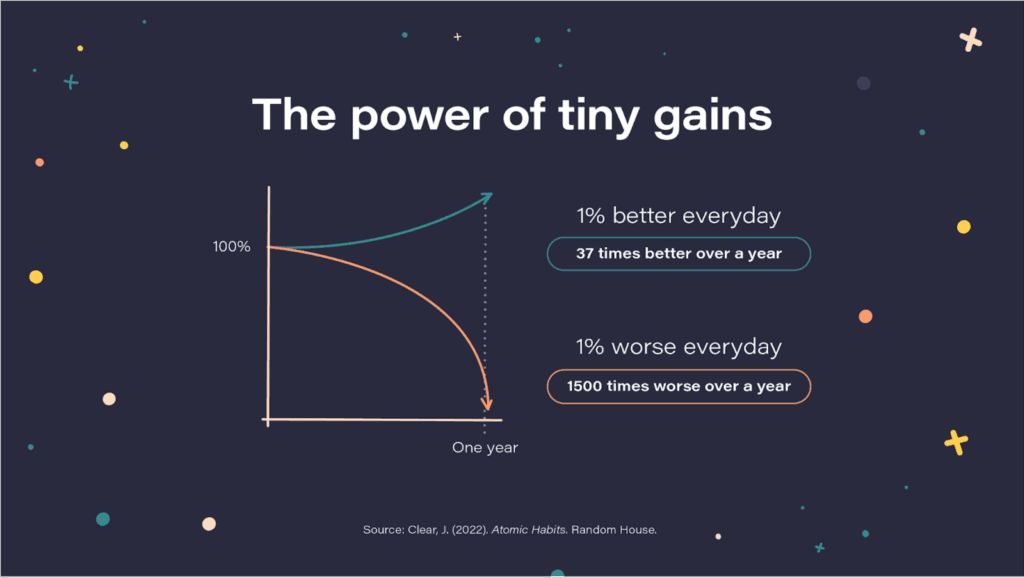

In our fast-paced world, it’s easy to overlook the power of small, consistent changes. Let’s explore this topic in more detail with Tic Tac Toe, a simple game that demonstrates how tiny shifts can lead to significant outcomes. Just as a well-placed ‘X’ or ‘O’ can turn the tide of a game, small daily improvements can revolutionize our lives. This article delves into the concept of becoming 1% better every day and how these incremental changes can compound over time, leading to remarkable personal growth and lifestyle transformation.
The idea of becoming 1% better every day might seem insignificant at first glance. After all, what difference can such a small improvement make? However, when we consider the compounding effect of these daily enhancements, the results become truly astounding. Let’s break down this concept to understand its profound impact on personal growth and lifestyle improvement.
Imagine you start with a baseline of 100 units of performance, skill, or knowledge. If you improve by 1% each day, after one year, you wouldn’t just be 365% better – you’d be 37.78 times better! This exponential growth occurs because each day’s improvement builds upon the improvements of previous days. It’s like compound interest for your personal development.
This principle applies to various aspects of life, from fitness and learning to productivity and relationships. By focusing on small, consistent improvements rather than dramatic overnight changes, we set ourselves up for sustainable, long-term success. The key is to embrace the power of habits and make these tiny improvements a part of our daily routine.
To effectively implement the 1% better principle, it’s crucial to identify the areas of your life where small improvements can yield the most significant results. This process requires self-reflection and honest assessment of your current situation, goals, and values. Here are some key areas to consider:
Your physical well-being forms the foundation for all other aspects of your life. Small improvements in this area can have far-reaching effects on your energy levels, mental clarity, and overall quality of life. Consider focusing on:
. Nutrition: Make one healthier food choice each day.
. Exercise: Add an extra minute to your workout or take a short walk during breaks.
. Sleep: Improve your sleep routine by going to bed 5 minutes earlier each night.
. Hydration: Drink one extra glass of water daily.
Nurturing your mental and emotional health is crucial for personal growth and happiness. Small steps in this area can lead to significant improvements in your overall well-being:
. Mindfulness: Practice one minute of mindfulness or meditation daily.
. Gratitude: Write down one thing you’re grateful for each day.
. Stress management: Incorporate a brief relaxation technique into your daily routine.
. Positive thinking: Challenge one negative thought with a positive perspective daily.
Continuous learning and skill development are essential for personal and professional growth. Focus on incremental improvements in areas relevant to your goals:
. Reading: Read one page of a book in your field of interest daily.
. Language learning: Learn one new word or phrase in a foreign language each day.
. Professional skills: Spend 15 minutes daily on a skill relevant to your career.
. Creative pursuits: Dedicate a few minutes each day to practicing a creative hobby.
Enhancing your productivity can help you achieve more in less time, creating space for personal growth and enjoyment. Consider these small improvements:
. Task prioritization: Identify and tackle your most important task first thing each morning.
. Time blocking: Allocate specific time slots for different activities and stick to them.
. Eliminating distractions: Reduce screen time by 5 minutes each day.
. Planning: Spend 5 minutes each evening planning for the next day.
Read more: The Best Books for Personal Growth and Life Inspiration
Now that we’ve identified areas for improvement, let’s explore strategies to effectively implement the 1% better principle in your daily life. Remember, the key is consistency and sustainability rather than drastic changes.
When setting your 1% improvement goals, be as specific and achievable as possible. Instead of a vague goal like “exercise more,” aim for something concrete like “do one extra push-up each day” or “walk 100 more steps than yesterday.” These small, specific goals are easier to track and achieve, providing a sense of accomplishment that motivates further progress.
Monitoring your improvements is crucial for maintaining motivation and staying on track. Consider using a habit-tracking app or a simple journal to record your daily 1% improvements. Seeing your progress visually can be incredibly motivating and help you identify patterns or areas where you might be struggling.
Your environment plays a significant role in your ability to make and sustain improvements. Set up your surroundings to support your goals. For example, if you’re aiming to read more, keep a book on your nightstand. If you want to eat healthier, stock your kitchen with nutritious snacks. By making it easier to engage in positive behaviors, you increase the likelihood of consistent improvement.
Share your 1% better goals with friends, family, or an online community. Having accountability partners can provide support, encouragement, and motivation when you face challenges. Consider joining or creating a group of like-minded individuals all working towards personal improvement.
Remember that the 1% better principle is about long-term, sustainable growth. There will be days when you don’t see immediate results or when you struggle to make your small improvement. Be patient with yourself and practice self-compassion. Focus on the overall trend of improvement rather than perfection every single day.
Acknowledge and celebrate your daily achievements, no matter how small they may seem. This positive reinforcement helps build momentum and motivation. Consider rewarding yourself in small ways for consistent progress, such as enjoying a favorite activity or treating yourself to something special after a week of successful improvements.
Read more: How to Reinvent Yourself at Any Age
While the concept of becoming 1% better every day is powerful, it’s not without its challenges. Understanding and preparing for these obstacles can help you maintain momentum and continue your growth journey.
It’s natural to experience periods where progress seems to slow down or stall. During these plateaus, it’s important to remember that growth is not always linear. Sometimes, the effects of your daily improvements are building up beneath the surface, preparing for a breakthrough. Stay consistent with your efforts and consider the following strategies:
. Reassess your goals: Ensure your 1% improvements are still challenging but achievable.
. Mix things up: Introduce variety into your routine to stimulate new growth.
. Seek feedback: Ask for input from others to gain new perspectives on your progress.
. Focus on the process: Shift your attention from outcomes to the daily act of improvement itself.
Setbacks are an inevitable part of any growth journey. Whether it’s a missed day of exercise, a moment of procrastination, or a temporary slip in healthy habits, it’s crucial to view these setbacks as learning opportunities rather than failures. Here’s how to bounce back:
. Practice self-forgiveness: Acknowledge the setback without harsh self-judgment.
. Analyze the cause: Understand what led to the setback to prevent future occurrences.
. Get back on track immediately: Don’t wait for the “perfect” moment to restart your efforts.
. Adjust your approach: If necessary, modify your goals or strategies based on what you’ve learned.